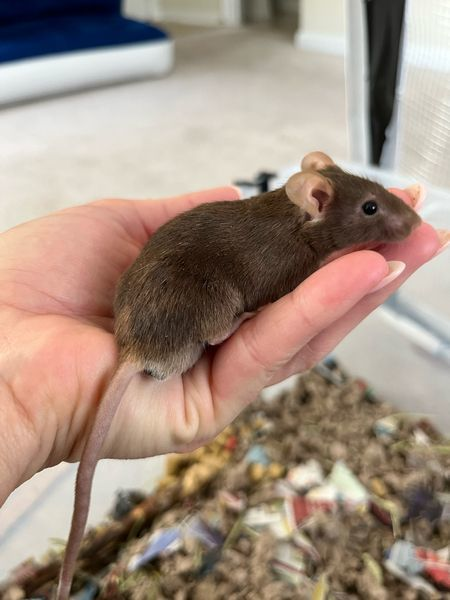So why not a post for the rodents, too? For those reading this web site in translation, let's explain: In US English "rat" usually refers to the dirty and detested house rat, a genus nobody wants to encourage, or in a metaphoric sense to a person who is despised or detested. But some unrelated wild animals with a similar look are also called rats--including the tiny trader rat who is currently hiding in a wall in my office room, warming her tiny adorable paws and waiting for another chance to eat raw stale rice--and so are some domestic animals. They're rodents, and the name for their species is rats, but they're no more related to house rats than they are to hamsters or gerbils. They were bred and born and raised indoors, to be pets.
All rodents, whether the species is called rats, mice, or some other name, have some things in common. Their teeth keep growing and have to be ground down by constant chewing on things they're not actually trying to eat. They surround themselves with a messy litter of chewed-up wood (and other things, if they're not confined to cages where all they can gnaw on is wood) and excrement. They and their mess can be contained, and they are clever enough to recognize the people who look after them and learn simple tricks, but their instincts are always calling them to gnaw and pry their way out of a cage and explore the world. When people tell stories about their pet rodents, the animals' big adventures usually involve being lost and found--sneaking out of their cages and being found nibbling on somebody's shoes, say. It can take a lot of responsibility to keep them from becoming nuisances. Rodents can be kept in a reasonably sanitary condition. Indoor pet rodents are vulnerable to the same diseases other rodents and humans get, but since they stay in their own space they're less likely to spread diseases than humans or outdoor animals are. They're quiet, and don't need much space or money to keep. In terms of teaching children responsibility, they're a step up from goldfish. Most species' average life expectancy is two years or less, but individuals of some species have lived seven years.
Zipcode 10101: Oreo, a Hamster from New York City
His web page: https://www.petfinder.com/small-furry/oreo-70357845/ny/new-york/protectors-of-paws-claws-ny1498/
That gorgeous coat is the result of hybridization between two fancy breeds. Oreo is described as a friendly little animal who likes to burrow into sand as well as dig and mess about in shavings.
Zipcode 20202: Barney, a Mouse from Maryland
His web page: https://www.petfinder.com/small-furry/barney-59860256/md/derwood/montgomery-county-animal-services-and-adoption-ctr-md423/
His web page has a photo album showing some of the paraphernalia you'll need if you want to adopt an adorable little tame mouse. We think of mice as timid little things because they seem to spend so much of their life hiding, but they can be adventurers, even warriors, like Reepicheep in Narnia. Some mice really do go into a berserker mode where they really will pick a fight, or continue a fight, with a cat. (Not that we recommend keeping any kind of rodent in the same house with a cat.) Barney is described as an adventurous mouse who will need a lot of watchful care.
Zipcode 30303: Excalibur, Gawaine, and Galahad from Decatur
Their web page: https://www.petfinder.com/small-furry/camelot-court-excalibur-galahad-gawaine-69861850/ga/norcross/the-georgia-rat-rescue-ga502/
It's a typical rodent story. Without a complete veterinary examination it can be hard to tell whether rodents are male or female. Size and odor are the main clues; males tend to be bigger and have a more conspicuous odor. So someone accepted what they thought were two female rats and got a male and female breeding pair. The bigger animal shown here is the father, and the other two are his sons. Domestic rats are social and can share a cage if it's big enough. Domesticated rats can come in the same drab color that house rats typically have, but these have been specially bred to look different from house rats, to be less disturbing to the neighbors of their human companions.



No comments:
Post a Comment